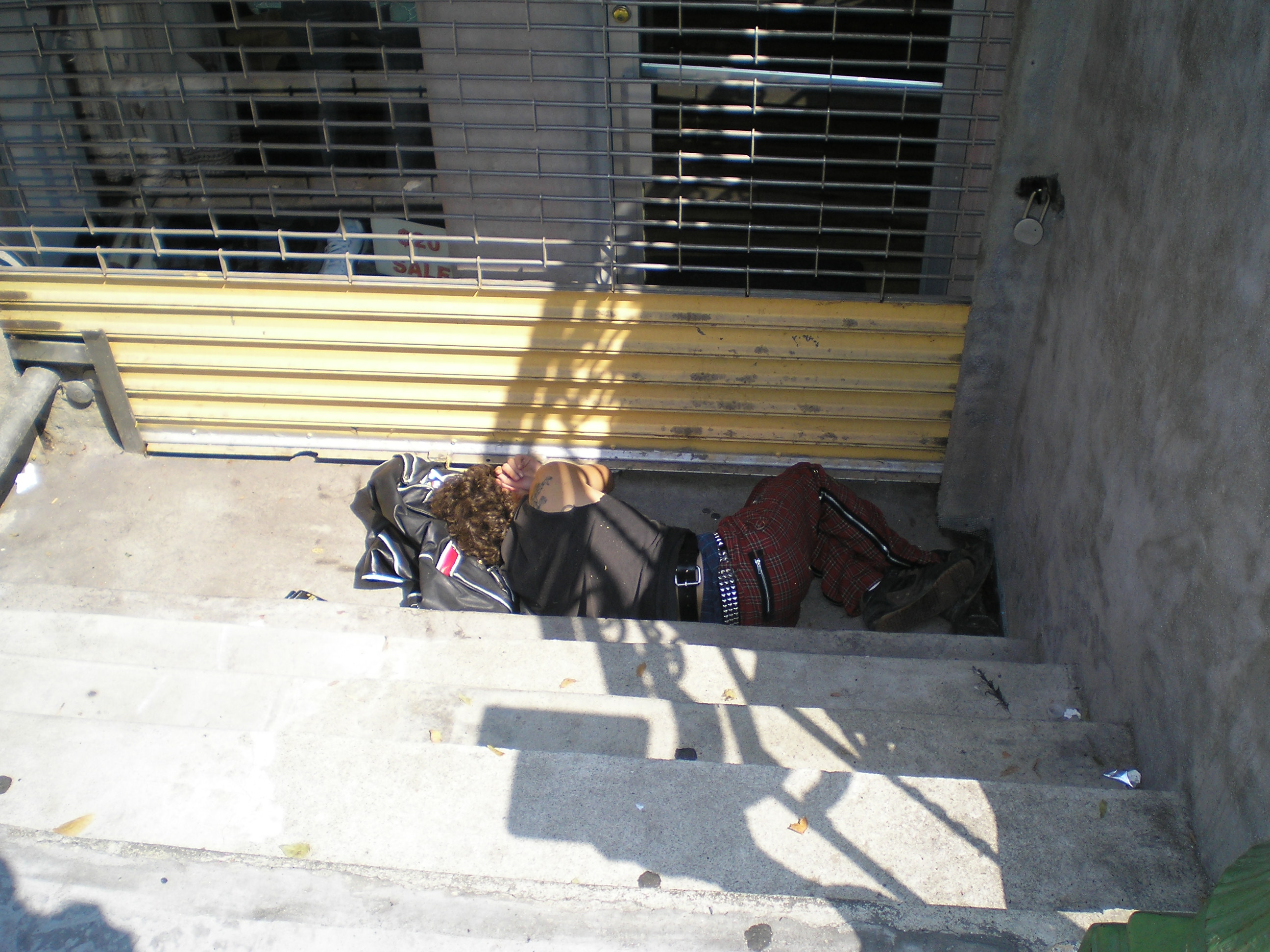A Conservative Anti-Poverty Program
A homeless man in the East Village, New York City. A situation we need to eliminate.
Photo Credit: Wikimedia Commons/David Shankbone
In my last post, Income Inequality In the United States, I wrote about how in a predominantly capitalist U.S. economy there is necessarily a great deal of income inequality. The systemic need for income inequality comes from the requirement that capital be concentrated in the hands of those who make the wisest investment decisions and who make the greatest contributions to economic growth. Nevertheless, we can not want more income inequality than is absolutely necessary to meet those goals. To do otherwise would not only be intolerable, but possibly unjust and would risk social instability. Recall the French Revolution of 1789, Marie-Antoinette, “Let them eat cake”, the guillotine, and all that!
What Is a Just Way of Determining How Much Income Inequality Is Required ?
If we must have income inequality in order to fuel economic growth, how should we determine just what level of inequality is absolutely required? As with many other economic decisions, I would suggest the most just method would be to rely on the impersonal mechanisms of the free-market. It is not the type of decision I would want to leave to a politician, Left or Right, nor to any crony capitalist influencing that politician. The power to make that kind of decision is too likely to corrupt the decision maker, to the detriment of either the poverty-stricken, or the economy, or both!
The way the economy would set the level of income inequality would come from the number of investment opportunities it provided. The more capital required by such investments, the more those who have saved, or who can borrow capital having demonstrated their skills at making profits, will make the required investments. Those who are successful in investing then are given even more assets from their profits to make further investments, while those who are unsuccessful lose at least a part of their invested assets to be given by the economy to the more successful.
The total assets available for investment are not unlimited. What is available is unconsumed production that is saved from incomes in savings accounts, IRA accounts, 401K and similar retirement funds, or saved under mattresses. In a single year the available savings is equal to the annual GDP less total consumption less taxes. This means investors must adjust their investments with other demands of consumption and of government. It is simply impossible for investing to become a black hole absorbing the entire annual income of the country. It is far more likely for consumption and government taxes, especially taxes, to limit investments so severely that economic growth is stunted. If savings and therefore investment are so restricted that not even replacement investments can be made, productive capacity will decrease and the GDP growth rate will be negative. Read The Solow-Swan Model and Where We Are Economically (1) and The Solow-Swan Model and Where We Are Economically (2) for the connections between savings, investment, and growth.

Photo Credit: Flickr.com/Library of Congress
One of the ways in which investments are limited is then what is taxed away by government to finance government programs, some of which are social welfare programs. Very few citizens are so cold-hearted they would consign the very poor to starvation or to a life with no hope for anything else than hunger and hardship. Almost all citizens would want to have some kind of program for helping out the poor. Believe it or not, this is even true for most conservatives! One of progressives’ favorite canards against conservatives is the accusation conservatives are totally indifferent to the plight of those mired in poverty. But then they also accuse conservatives of being unmitigated racists, even while Republicans had the only major black Presidential candidate in this cycle, and Republicans have elected a number of black congressmen in previous cycles. Is this not unusual behavior for racists?
Nevertheless, a majority of Americans (including Republicans!) would want some sort of welfare program to help the poor. This, however, is where the problem gets tricky. We must worry not only about what kind of government program we construct, but about its size in dollars as well. Just as limits to investments are imposed by consumption and taxes, we must also limit government taxes, and therefore the size of welfare programs, so that we do not strangle economic growth. We must have both taxes and government spending small enough that there is enough savings left to fuel not only replacement investments to maintain our current production capacity, but to allow net investment (savings minus replacement investment) to increase our productive capacity. We are very far from a steady state economy in which every one’s needs and desires, subject to the constraints of physical reality, are satisfied.
I argued in Distribution and Use of Wealth in U.S. Capitalism that as long as there is net investment and therefore economic growth, eventually the economy would approach such a steady-state and market mechanisms would then begin to equilibrate incomes. This would eliminate the income inequality that so excites the Left today. Recall that the major economic mechanism maintaining income inequality is return from net investments. As a steady-state economy is approached, there will be progressively less return from such investments since all demand by definition of a steady-state economy will be progressively saturated. Recall the law of marginal utility. Then, since there would be no return to net investments, total investments would be reduced to replacement investments and economic growth would cease. The motive for continuing replacement investments would not be to increase wealth, but to maintain it. Please note that this is exactly the opposite of the way that Thomas Piketty thinks economic development will proceed.
What We Should Not Want in a Welfare Program
In thinking about what kind of anti-poverty welfare program would be best, I think it would be a very fruitful exercise to think about what such a program should not do. The first negative requirement then is the one discussed in the last section. The welfare program should not be so large that it prohibits economic growth. In fact the smaller the welfare program, the larger net investments would be and the sooner a steady-state economy could be approached. This is not an argument for eliminating all welfare programs, but to make them as small as possible and still accomplish what is desired. Just what the phrase “what is desired” means is a design feature yet to be determined.
Since any anti-poverty program should aim at raising the program’s beneficiaries to the level of the affluent, it should encourage the beneficiaries to develop character traits that enable them to seek wealth independently. This means anti-poverty programs should not be straight transfers of wealth from the affluent to the poor. Instead there should be requirements for the program’s recipients to either prepare for or actively seek work. We should not offer “bread and circuses”, since we definitely do not want to seek the same demise as the Roman Empire!
In addition, there is the observation by many that all too often in the past welfare programs encouraged poor fathers to abandon their families, leaving only the mothers to parent their children. While this trend was originally noted in black, inner-city families, it is also increasingly being seen in all ethnic groups. Concerning this problem, I noted in the post Is Racism the Cause of Blacks’ Problems – Or is Government?,
He [Dr. Walter Williams, Professor of Economics, George Mason University] sees the destructive behavior of black fathers abandoning their families as being enabled by the welfare state. If the mother receives assistance in the form of food stamps, welfare assistance, and housing subsidies, it is less costly for the parents to separate. One non-governmental cause for one-parent black families to which Williams points is the growing social acceptance and lessening stigma of unwed-parenthood. In fact black families are not the only ones that are trending to single-mother parented families. The Child Trends Data Bank has an online report showing that all US families are going in that direction. They show a decrease in two-parent families from 87.7% in 1960 to 64.4% in 2014; they also show an increase in single-mother families from 8.0% in 1960 to 23.6% in 2014. … It is a well-established fact that children living in a two-parent family are better-off financially and emotionally, and are more healthy. [See here and here and hereand here.] As a piece of corroborating evidence, Williams offers the fact that the poverty rate for black wedded couples has been in the single digits since 1994.
Somehow, we must construct our welfare programs so that they discourage single-parent families.
Much To Think About In the Future – And Much To Be Careful About!
This is a very complicated problem, at least as and quite possibly more complicated than figuring out how to make a well-functioning economy. Therefore I can not pretend to have any answers. The only suggestions I currently have are the negative ones I offered in the previous section. Nevertheless, we have no choice – if we value our humanity – but to think long and seriously about solutions.
Clearly, one of the very best components of a solution would be to have a vibrantly growing economy that offered a cornucopia of new jobs. However, as I noted in my last post, the newly created jobs of today require a somewhat different kind of education that is also usually more intensive and extensive than was typically true in the past. Therefore, any well-crafted solution would have to have some component of remedial education.
Also, just as I did in the post The “Science” of Economics, I suggest great caution. Any experiment in social-welfare policy affects the welfare and well-being of a very large number of human beings. There is a potential for great harm, as Sen. Daniel Patrick Moynihan noted 50 years ago in his much maligned report on the effects of welfare policies on the black family. Even more than with experiments on economic policies, politicians should be required to take a version of the Hippocratic oath. With families in poverty, they should first do no harm.
Views: 1,820






























